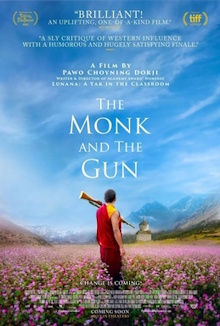I’m pretty sure this is the very first film from Bhutan I’ve seen and it’s a good one too that has wowed audiences in international film festivals. It uses the country’s natural beauty to great effect as anyone would expect but more than that, it offers a salient commentary on its politics. It could be argued that this constitutes propaganda and I don’t like how negatively it characterizes democracy. Still it’s a very funny film that keeps you on the edge of your seat wondering how it will end and perhaps it’s not an unfair portrayal of the country so I’d rate it very highly.
Tashi is a monk who assists a highly respected and reclusive lama in the remote town of Ura. As Bhutan prepares to transition to democracy, the government holds mock elections to educate its citizens on how voting works but turnout is low. An official is sent to Ura to encourage the villagers to register to vote. Hearing the news on the radio, the lama orders Tashi to procure two guns in time for the full moon when the voting will take place. Tashi unquestioningly descends to the village to ask about who has a gun. Meanwhile an American gun collector Ron arrives in the country and is brought by his guide and translator Benji to Ura. He has tracked down a rare gun dating from the American Civil War and is prepared to pay a great deal of money for it. The villager who has it is shocked by the amount on offer, agreeing instead to a lesser amount. But before Ron and Benji can bring him the money, Tashi arrives and hearing that the lama needs the gun, the villager instantly offers the gun for next to nothing. Scrambling after Tashi, Ron and Benji offer him two modern firearms in exchange for the historical relics. At the same time, the populace of the village are riven by conflict over the upcoming elections as most people wonder why they should change their way of life.
Between the spectacular scenic backdrop of the Bhutanese countryside, the exoticism of their culture, and the sheer incongruity of a Buddhist monk wandering around with a rifle, this is a winning formula for sure. It’s not just Tashi who obeys the lama’s instructions without a thought, everyone else in the village similarly don’t even question why the lama wants a gun. Plus we also have plenty of scenes of the Bhutanese struggling to adapt to modernity and the concept of elections. Tashi watches Quantum of Solace on a poor quality communal television while sipping Coke that he calls black water. Perhaps it’s somewhat demeaning to exploit their unfamiliarity with the trappings of modern civilization for comedic purposes but it’s not mean spirited and it is funny. The constant refrain in this film is that life is good in Bhutan and all of this disruption is of questionable value. Finally the gun is a presence in this film that cannot be ignored. We can’t help but wonder if it will all end in violence and so are driven to find out what happens next. It’s such a smart, masterfully written script by Pawo Choyning Dorji who also executed it well.
The constant slagging of democracy by the villagers and the weak defense of it by the government does convey the impression that this is itself the film’s stance. In response to complaints that it is causing strife, the official from the capital is only able to say that this is part of joining the modern world. The portrayal of Ura as an idyllic village and their instinctive loyalty to the king feels like propaganda. I think it would be understandable to show that the villagers are merely uninformed about democracy but the film seems to be pushing the message that it is unnecessary. They do show at least one person asking how can they be said to be happy when they live in such poverty. I also like that it shows glimpses of life in the capital city. Benji for one certainly wants money, has contacts with the criminal world and there’s even a short scene set in the Bhutan equivalent of a nightclub. As far as I can tell, Bhutan did have a successful transition to democracy as the blurb at the end of the film states, so attacking it this way feels petty.
The film’s political stance leaves a sour taste in my mouth but doesn’t change the fact that it’s excellent. It’s wonderful to finally see what life in Bhutan is like and it’s genuinely impressive how densely packed with information this film is, while having a funny and entertaining plot. The visuals are spectacular and you can tell how skillfully Dorji makes use of a non-professional actors. Highly recommended.
